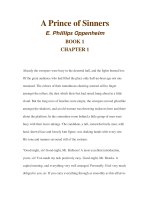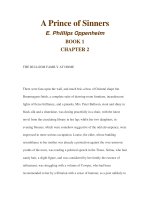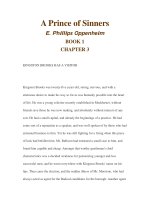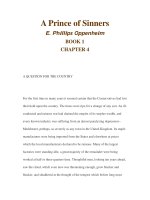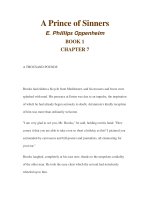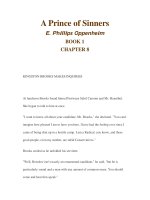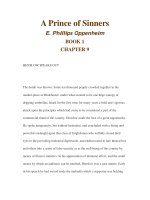A Prince of Sinners E. Phillips Oppenheim BOOK 2 CHAPTER 9 potx
Bạn đang xem bản rút gọn của tài liệu. Xem và tải ngay bản đầy đủ của tài liệu tại đây (24.45 KB, 10 trang )
A Prince of Sinners
E. Phillips Oppenheim
BOOK 2
CHAPTER 9
GHOST
Brooks, relieved that his explanation with Mr. Bullsom was over, was
sufficiently entertaining at dinner-time. He sat between Selina and Louise, and
made himself agreeable to both. Mr. Bullsom for half the time was curiously
abstracted, and for the remainder almost boisterous. Every now and then he
found himself staring at Brooks as though at some natural curiosity. His
behaviour was so singular that Selina commented upon it.
"One would think, papa, that you and Mr. Brooks had been quarrelling," she
remarked, tartly. "You seem quite odd to-night."
Mr. Bullsom raised his glass. He had lately improved his cellar.
"Drink your health, Brooks," he said, looking towards him. "We had an
interesting chat, but we didn't get quarrelling, did we?"
"Nor are we ever likely to," Brooks answered, smiling. "You know, Miss
Bullsom, your father was my first client of any importance, and I shan't forget
how glad I was to get his cheque."
"I'm very pleased that he was useful to you," Selina answered, impressively.
"Will you tell me something that we want to know very much?"
"Certainly!"
"Are you really not coming back to Medchester to live?"
Brooks shook his head.
"No. I am settling down in London. I have found some work there I like."
"Then are you the Mr. Brooks who has started what the Daily Courier calls a
'Whiteby's Charity Scheme' in the East End?"
"Quite true, Miss Bullsom. And your cousin is helping me."
Selina raised her eyebrows.
"Dear me," she said, "I had no idea that Many had time to spare for that sort of
thing, had you, father?
"Many can look after herself, and uncommonly well too," Mr. Bullsom
answered.
"She comes mostly in the evening," Brooks explained, "but she is one of my
most useful helpers."
"It must be so interesting to do good," Louise said, artlessly. "After dinner, Mr.
Brooks, will you tell us all about it?"
"It seems so odd that you should care so much for that sort of thing," Selina
remarked. "As a rule it is the frumpy and uninteresting people who go in for
visiting the poor and doing good, isn't it? You seem so young, and so oh, I
don't think I'd better go on."
"Please do," Brooks begged.
"Well, you won't think I was trying to flatter, will you, but I was going to say,
and too clever for that sort of thing."
Brooks smiled.
"Perhaps," he said, "the reason that social reform is so urgently needed in so
many ways is for that very reason, Miss Bullsom that the wrong sort of person
has been going in for it. Looking after the poor has meant for most people
handing out bits of charity on the toasting-fork of religion. And that sort of thing
doesn't tend to bridge over the gulf, does it?"
"Toasting-fork!" Selina giggled. "How funny you are, Mr. Brooks."
"Am I?" he answered, good-humouredly. "Now let me hear what you have been
doing since I saw you in town."
Selina was immediately grave not to say scornful.
"Doing! What do you suppose there is to do here?" she exclaimed,
reproachfully. "We've been sitting still waiting for something to happen. But
have you said anything to Mr. Brooks yet, papa?"
Mr. Bullsom shook his head.
"Haven't had time," he answered. "Brooks had so much to say to me. You knew
all about our land company, Brooks, of course? You did a bit of conveyancing
for us.
"Of course I did," Brooks answered, "and I told you from the first that you were
going to make a lot of money by it."
Mr. Bullsom glanced around the room. The two maid-servants were at the
sideboard.
"Guess how much."
Brooks shook his head.
"I never knew your exact share," he said.
"It's half a million," Mr. Bullsom said, pulling down his waistcoat, and squaring
himself to the table. "Not bad, eh, for a country spec?"
"It's wonderful," Brooks admitted. "I congratulate you heartily."
"Thanks," Mr. Bullsom answered.
"We want papa to buy a house in the country, and go to town for the season,"
Selina said. "So long as we can afford it I am dying to get out of Medchester. It
is absolutely the most commercial town I have ever been in.
"Your father should stand for Parliament himself," Brooks suggested.
It is really possible that Mr. Bullsom, being a man governed entirely by one idea
at a time, had never seriously contemplated the possibility of himself stepping
outside the small arena of local politics. It is certain at any rate that Brooks'
words came to him as an inspiration. He stared for a moment into his glass then
at Brooks. Finally he banged the table with the flat of his hand.
"It's an idea!" he exclaimed. "Why not?"
"Why not, indeed?" Brooks answered. "You'd be a popular candidate for the
borough."
"I'm chairman of the committee," Mr. Bullsom declared; "I'll propose myself.
I've taken the chair at political dinners and meetings for the last twenty years. I
know the runs, and the people of Medchester know me. Why not, indeed? Mr.
Brooks, sir, you're a genius."
"You 'ave given him something to think about," Mrs. Bullsom murmured,
amiably. "I'd be willing enough but for the late hours. They never did agree with
Peter did they? He's always been such a one for his rest."
Mr. Bullsom's thumbs made their accustomed pilgrimage.
"In the service of one's country," he said, "one should be prepared to make
sacrifices. The champagne, Amy. Besides, one can always sleep in the
morning."
Selina and Louise exchanged glances, and Selina, as the elder, gave the project
her languid approval.
"It would be nice for us in a way," she remarked. "Of course you would have a
house in London then, papa, and being an M.P. you would get cards for us to a
lot of 'at homes' and things. Only I wish you were a Conservative."
"A Liberal is much more fashionable than he was," Brooks assured her,
cheerfully.
"Fashionable! I know the son of a Marquis, a Lord himself, who's a Liberal, and
a good one," Mr. Bullsom remarked, with a wink to Brooks.
"Well, my dears," Mrs. Bullsom said, making an effort to rise, and failing at the
first attempt, "shall we leave the gentlemen to talk about it over their wine?
"Oh, you sit down again, mother," Selina directed.
"That sort of thing's quite old-fashioned, isn't it, Mr. Brooks? We're going to
stay with you. You can smoke. Ann, bring the cigars."
Mrs. Bullsom, who was looking forward to a nap in a quiet corner of the
drawing-room, obeyed with resignation written large on her good-natured,
somewhat flushed face. But Mr. Bullsom, who wanted to revert to the subject
which still fascinated him, grunted.
"Hang these new ideas," he said. "It's you they're after, Mr. Brooks. As a rule,
they're off before I can get near my cigar-box."
Selina affected a little consciousness, which she felt became her.
"Such foolishness, papa. You don't believe it, do you, Mr. Brooks?"
"Am I not to, then?" he asked, looking down upon her with a smile. Whereupon
Selina's consciousness became confusion.
"How stupid you are," she murmured. "You can believe just what you like.
What are you looking at over in the corner of the room?"
"Ghosts," he answered.
Yet very much as those images flitted at that moment through his brain, so
events were really shaping themselves in that bare clean-swept room into which
his eyes had for a moment strayed away. Mary Scott was there, her long apron
damp with soap-suds and her cheeks red with exertion, for she had just come
from bathing twelve youngsters, who, not being used to the ordeal, had given
trouble. There were other of his helpers too, a dozen of them up to their eyes in
work, and a long string of applicants patiently waiting their turn. The right sort
too the sort from underneath pale-faced, hollow-eyed, weary, yet for a
moment stirred from their lethargy of suffering at the prospect of some passing
relief. There was a young woman, hollow-cheeked, thin herself as a lath, eager
for work or chance of work for her husband that morning out of hospital, still
too delicate to face the night air and the hot room. He knew shorthand, could
keep books, typewrite, a little slip about his character, but that was all over and
done with. A bank clerk with L90 a year, obliged to wear a silk hat, who marries
a penniless girl on his summer holiday. They must live, both of them, and the
gold passed through his fingers day by day, an endless shower. The magistrates
had declined to sentence him, but the shame and he was never strong. Brooks
saw the card made out for that little cottage at Hastings, and enclosed with the
railway ticket Owston was picking up fast there and smiled faintly. He saw the
girl on her breathless way home with the good news, saw her wet face heaven
turned for the first time for many a month. There were men and women in the
world with hearts then. They were not all puppets of wood and stone, even as
those bank directors. Then, too, she would believe again that there might be a
God.
Ghosts! They were plentiful enough. There was the skin-dresser his fingers still
yellow with the dye of the pith. Things were bad in Bermondsey. The master
had gone bankrupt, the American had filched away his trade. No one could find
him work. He was sober enough except at holiday time and an odd Saturday a
good currier there might be a chance for him in the country, but how was he to
get there? And in any case now, how could he? His wife had broken down, lay
at home with no disease that a hospital would take her in for, sinking for want of
good food, worn out with hard work, toiling early and late to get food for the
children until her man should get a job. There was the workhouse, but it meant
separation, perhaps for ever, and they were man and wife, as much needed the
one by the other, perhaps more, as their prototype in the world of plenty. Again
Brooks smiled. He must have seen Flitch, a capital chap Flitch, making up that
parcel in the grocery department and making an appointment for three days'
time. And Menton, too, the young doctor, as keen on the work as Brooks
himself, but paid for his evenings under protest, overhears the address why, it
was only a yard or two. He would run back with the man and have a look at his
wife. He had some physic he felt sure it was just what she wanted. So out into
the street together, and no wonder the yellow-stained fingers that grasped the
string of the parcel shook, and the man felt an odd lump in his throat, and a
wave of thankfulness as he passed a flaring public-house when half-an-hour ago
he had almost plunged madly in to find pluck for the river devil's pluck. The
woman. Nothing the matter with her but what rest and good food would cure.
Another case for that little cottage. Lucky there were others being made ready.
"What sort of ghosts, Mr. Brooks?" Selina asked, a little more sharply.
He started, and withdrew his eyes at last.
"Ah, Miss Bullsom," he answered, "just the ghosts we all carry with us, you
know, the ghosts of our thoughts, living and dead, good and evil."
"How funny you are, Mr. Brooks," she exclaimed.
